Fleurs du Mal Magazine


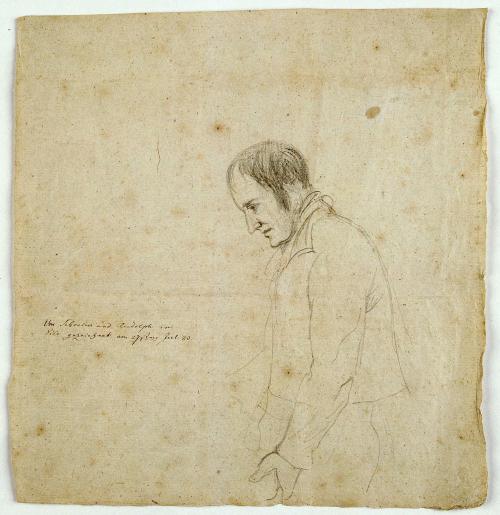
Da ich ein Knabe war…
Da ich ein Knabe war,
Rettet′ ein Gott mich oft
Vom Geschrei und der Ruthe der Menschen,
Da spielt′ ich sicher und gut
Mit den Blumen des Hains,
Und die Lüftchen des Himmels
Spielten mit mir.
Und wie du das Herz
Der Pflanzen erfreust,
Wenn sie entgegen dir
Die zarten Arme streken,
So hast du mein Herz erfreut
Vater Helios! und, wie Endymion,
War ich dein Liebling,
Heilige Luna!
Oh all ihr treuen
Freundlichen Götter!
Daß ihr wüßtet,
Wie euch meine Seele geliebt!
Zwar damals rieff ich noch nicht
Euch mit Nahmen, auch ihr
Nanntet mich nie, wie die Menschen sich nennen
Als kennten sie sich.
Doch kannt′ ich euch besser,
Als ich je die Menschen gekannt,
Ich verstand die Stille des Aethers
Der Menschen Worte verstand ich nie.
Mich erzog der Wohllaut
Des säuselnden Hains
Und lieben lernt′ ich
Unter den Blumen.
Im Arme der Götter wuchs ich groß.
Friedrich Hölderlin
(1770 – 1843)
Da ich ein Knabe war…
Gedicht
•fleursdumal.nl magazine
More in: Archive G-H, Archive G-H, Hölderlin, Friedrich

Grabgesang
Vor des Friedhofs dunkler Pforte
Bleiben Leid und Schmerzen stehn,
Dringen nicht zum heil’gen Orte,
Wo die sel’gen Geister gehn,
Wo nach heißer Tage Glut
Unser Freund in Frieden ruht.
Zu des Himmels Wolkentoren
Schwang die Seele sich hinan,
Fern von Schmerzen, neu geboren,
Geht sie auf — die Sternenbahn;
Auch vor jenen heil’gen Höhn
Bleiben Leid und Schmerzen stehn.
Sehnsucht gießet ihre Zähren
Auf den Hügel, wo er ruht;
Doch ein Hauch aus jenen Sphären
Füllt das Herz mit neuem Mut;
Nicht zur Gruft hinab — hinan,
Aufwärts ging des Freundes Bahn.
Drum auf des Gesanges Schwingen
Steigen wir zu ihm empor,
Unsre Trauertöne dringen
Aufwärts zu der Sel’gen Chor,
Tragen ihm in stille Ruh’
Unsre letzten Grüße zu.
Wilhelm Hauff
(1802 – 1827)
Grabgesang, Gedicht
• fleursdumal.nl magazine
More in: Archive G-H, Archive G-H, Galerie des Morts, Hauff, Hauff, Wilhelm, Tales of Mystery & Imagination
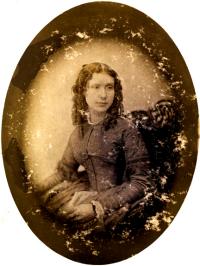
Madeline. A Legend Of The Mohawk
Where the waters of the Mohawk
Through a quiet valley glide,
From the brown church to her dwelling
She that morning passed a bride.
In the mild light of October
Beautiful the forest stood,
As the temple on Mount Zion
When God filled its solitude.
Very quietly the red leaves,
On the languid zephyr’s breath,
Fluttered to the mossy hillocks
Where their sisters slept in death:
And the white mist of the Autumn
Hung o’er mountain-top and dale,
Soft and filmy, as the foldings
Of the passing bridal veil.
From the field of Saratoga
At the last night’s eventide,
Rode the groom, – a gallant soldier
Flushed with victory and pride,
Seeking, as a priceless guerdon
From the dark-eyed Madeline,
Leave to lead her to the altar
When the morrow’s sun should shine.
All the children of the village,
Decked with garland’s white and red,
All the young men and the maidens,
Had been forth to see her wed;
And the aged people, seated
In the doorways ‘neath the vine,
Thought of their own youth and blessed her,
As she left the house divine.
Pale she was, but very lovely,
With a brow so calm and fair,
When she passed, the benediction
Seemed still falling on the air.
Strangers whispered they had never
Seen who could with her compare,
And the maidens looked with envy
On her wealth of raven hair.
In the glen beside the river
In the shadow of the wood,
With wide-open doors for welcome
Gamble-roofed the cottage stood;
Where the festal board was waiting,
For the bridal guests prepared,
Laden with a feast, the humblest
In the little village shared.
Every hour was winged with gladness
While the sun went down the west,
Till the chiming of the church-bell
Told to all the hour for rest:
Then the merry guests departed,
Some a camp’s rude couch to bide,
Some to bright homes, – each invoking
Blessings on the gentle bride.
Tranquilly the morning sunbeam
Over field and hamlet stole,
Wove a glory round each red leaf,
Then effaced the Frost-king’s scroll:
Eyes responded to its greeting
As a lake’s still waters shine,
Young hearts bounded, – and a gay group
Sought the home of Madeline.
Bird-like voices ‘neath the casement
Chanted in the hazy air,
A sweet orison for wakening, –
Half thanksgiving and half prayer.
But no white hand drew the curtain
From the vine-clad panes before,
No light form, with buoyant footstep,
Hastened to fling wide the door.
Moments numbered hours in passing
‘Mid that silence, till a fear
Of some unseen ill crept slowly
Through the trembling minstrels near,
Then with many a dark foreboding,
They, the threshold hastened o’er,
Paused not where a stain of crimson
Curdled on the oaken floor;
But sought out the bridal chamber.
God in Heaven! could it be
Madeline who knelt before them
In that trance of agony?
Cold, inanimate beside her,
By the ruthless Cow-boys slain
In the night-time whilst defenceless,
He she loved so well was lain;
O’er her bridal dress were scattered,
Stains of fearful, fearful dye,
And the soul’s light beamed no longer
From her tearless, vacant eye.
Round her slight form hung the tresses
Braided oft with pride and care,
Silvered by that night of madness
With its anguish and despair.
She lived on to see the roses
Of another summer wane,
But the light of reason never
Shone in her sweet eyes again.
Once where blue and sparkling waters
Through a quiet valley run,
Fertilizing field and garden,
Wandered I at set of sun;
Twilight as a silver shadow
O’er the softened landscape lay,
When amid a straggling village
Paused I in my rambling way.
Plain and brown the church before me
In the little graveyard stood,
And the laborer’s axe resounded
Faintly, from the neighboring wood.
Through the low, half-open wicket
Deeply worn, a pathway led:
Silently I paced its windings
Till I stood among the dead.
Passing by the grave memorials
Of departed worth and fame,
Long I paused before a record
That no pomp of words could claim:
Simple was the slab and lowly,
Shaded by a fragrant vine,
And the single name recorded,
Plainly writ, was “Madeline.”
But beneath it through the clusters
Of the jessamine I read,
“Spes,” engraved in bolder letters, –
This was all the marble said.
Mary Gardiner Horsford
(1824-1855)
Madeline. A Legend Of The Mohawk
•fleursdumal.nl magazine
More in: Archive G-H, Archive G-H, CLASSIC POETRY, Western Fiction
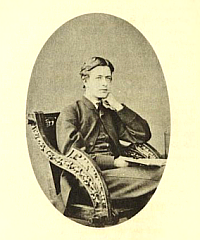
After reading Aeschylus
I will not sing my little puny songs.
It is more blessed for the rippling pool
To be absorbed in the great ocean-wave
Than even to kiss the sea-weeds on its breast.
Therefore in passiveness I will lie still,
And let the multitudinous music of the Greek
Pass into me, till I am musical.
Digby Mackworth Dolben
(1848 – 1867)
After reading Aeschylus
• fleursdumal.nl magazine
More in: Archive C-D, Archive C-D, Digby Mackworth Dolben
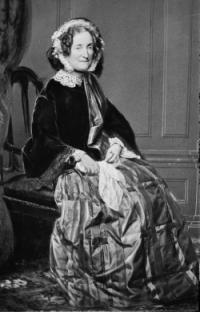
Lincoln
God placed on Lincoln’s brow
A sad, majestic crown;
All enmity is friendship now,
And martyrdom renown.
A mighty-hearted man,
He toiled at Freedom’s side,
And lived, as only heroes can,
The truth in which he died.
Like Moses, eyes so dim,
All signs he could not spell;
Yet he endured, as seeing Him
Who is invisible.
His life was under One
“Who made and loveth all;”
And when his mighty work was done,
How grand his coronal!
Mrs. Sigourne
(Lydia Huntley Sigourney,
1791 – 1865)
Lincoln
• fleursdumal.nl magazine
More in: Archive S-T, Archive S-T, CLASSIC POETRY
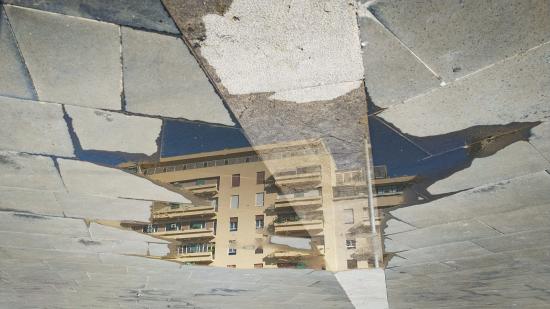
Experimentele fotografie in de raamtentoonstellingen aan de Stedekestraat. Kim Pattiruhu vertoont veelal nieuw werk. Vanaf vrijdagavond 15 januari 2021, dag en nacht geopend. Ondanks de zoveelste lockdown kunt u ons nog steeds bezoeken. Reserveren niet nodig, mondkapje evenmin. De expositie duurt tot en met zondag 14 maart 2021. Komt dat zien!
“Het werk van Kim Pattiruhu kenmerkt zich,” volgens Joris van Laak, “door haar, ogenschijnlijk eenvoudige, blik op de imperfecties van onze wereld. Deze fascinatie voor de rauwe dingen des levens geven de toeschouwer een inkijkje in een wereld waar niets is wat het in eerste instantie lijkt. Daar waar de waarneming meerdere invalshoeken biedt. Werelden van contrastrijk verval waarin de mens en de natuur centraal staan. Maar dan net even anders.”
Kim Pattiruhu (Tilburg, 1982) volgde fotografie aan de kunstakademie St. Joost in Breda en stelt als onderzoekend fotograaf levensvragen vanuit een diepgewortelde drang om het leven en al zijn rauwe randjes te begrijpen. “Met veel gevoel voor detail zoek ik het verhaal van het onooglijke en onaanzienzienlijke, van de schoonheid van het alledaagse. Fotografie is mijn middel om een wereld die voor de gehaaste hedendaagse mens normaal verborgen blijft in beeld te brengen.” Daarbij schuwt zij het niet nieuwe technieken toe te passen en onalledaagse materialen als ondergrond voor haar fotografisch werk te gebruiken.
‘Metamorfose’
tentoonstelling Kim Pattiruhu
15 januari t/m 14 maart 2021
dagelijks, dag en nacht, toegang vrij
‘Metropolitan Museum | Tilburg’
Stedekestraat 15, 5041DM Tilburg
productie: Dorith van der Lee
telefoon: 013 5358041 / 06 20325030
email: post@metropolitanmuseum.nl
website: www.metropolitanmuseum.nl
Kim Pattiruhu: www.kimpattiruhu.nl
foto ‘Plain Palermo’ © Kim Pattiruhu
#Kim Pattiruhu
Experimentele fotografie
•fleursdumal.nl magazine
More in: Art & Literature News, Exhibition Archive, Metropolitan Museum Tilburg, Photography, Theater van de Verloren Tijd
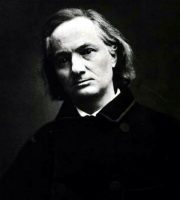
Le Revenant
Comme les anges à l’oeil fauve,
Je reviendrai dans ton alcôve
Et vers toi glisserai sans bruit
Avec les ombres de la nuit;
Et je te donnerai, ma brune,
Des baisers froids comme la lune
Et des caresses de serpent
Autour d’une fosse rampant.
Quand viendra le matin livide,
Tu trouveras ma place vide,
Où jusqu’au soir il fera froid.
Comme d’autres par la tendresse,
Sur ta vie et sur ta jeunesse,
Moi, je veux régner par l’effroi.
Charles Baudelaire
(1821-1867)
Le Revenant
(poème)
• fleursdumal.nl magazine
More in: Archive A-B, Archive A-B, Baudelaire, Baudelaire, Charles
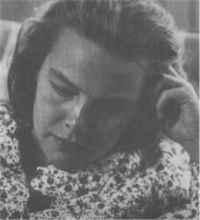
Lullaby
Sleep, little architect. It is your mother’s wish
That you should lave your eyes and hang them up in dreams.
Into the lowest sea swims the great sperm fish.
If I should rock you, the whole world would rock within my arms.
Your father is a greater architect than even you.
His structure falls between high Venus and far Mars.
He rubs the magic of the old and then peers through
The blueprint where lies the night, the plan the stars.
You will place mountains too, when you are grown.
The grass will not be so insignificant, the stone so dead.
You will spiral up the mansions we have sown.
Drop your lids, little architect. Admit the bats of wisdom into your head.
Joan Murray
(1917-1942)
Lullaby
Poems 1917-1942
New Haven: Yale University Press, 1975
• fleursdumal.nl magazine
More in: Archive M-N, Archive M-N, Joan Murray

De losprijs van de wederkeer
Kruis en anker is het denken, hartsgrondig als
de eenzaamheid van eerstelingen. Nooit vergeten
die dat bouwen op de trouw van tijd maar al
te vaak verglijdt naar lusteloosheid. Passanten
blikken op naar ramen die niet ontsloten worden.
Daarachter mogen van onwil scherpe sporen
worden gewist. Primipara’s snikken er van vreugde
en pijn. In de plooien van hun klanken wankelt het
contrapunt. Nu moet je maar wachten of iemand
in ootmoed herboren de losprijs van de wederkeer
herkent. Nu moet je maar beter gewoon wachten.
Want geluk is meer dan blij zijn met je ademen.
Wreed is hij die nimmer weent.
Bert Bevers
gedicht
De losprijs van de wederkeer
(Eerder verschenen in Eigen terrein – Gedichten 1998-2013,
Uitgeverij WEL, Bergen op Zoom, 2013)
• fleursdumal.nl magazine
More in: Archive A-B, Archive A-B, Bevers, Bert

The Poet’s Lesson
There came a voice from the realm of thought,
And my spirit bowed to hear,–
A voice with majestic sadness fraught,
By the grace of God most clear.
A mighty tone from the solemn Past,
Outliving the Poet-lyre,
Borne down on the rush of Time’s fitful blast.
Like the cloven tongues of fire.
Wouldst thou fashion the song, O! Poet-heart,
For a mission high and free?
The drama of Life, in its every part,
Must a living poem be.
Wouldst thou speed the knight to the battle-field,
In a proven suit of mail?
On the world’s highway, with Faith’s broad shield,
The peril go forth to hail.
For the noble soul, there is noble strife,
And the sons of earth attain,
Through the wild turmoil and storm of Life,
To discipline, through pain.
Think not that Poesy liveth alone,
In the flow of measured rhyme;
The noble deed with a mightier tone
Shall sound through latest time.
Then poems two, at each upward flight,
In glorious measure fill;
Be the Poem in words, one of beauty and might,
But the Life one, loftier still.
Mary Gardiner Horsford
(1824-1855)
The Poet’s Lesson.
• fleursdumal.nl magazine
More in: Archive G-H, Archive G-H, CLASSIC POETRY
In Parkzicht brengt Paul Bezembinder een tragische liefdesgeschiedenis.
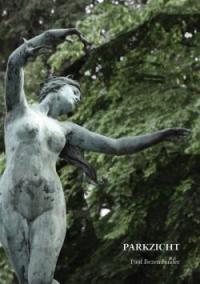 Met zijn inmiddels gevestigde combinatie van klassieke poëzie, pastiche en smartlap laveert hij moeiteloos langs de Scylla van de zoetsappigheid en de Charybdis van de chaos. Het resulteert in beelden die beklijven, die klemmen op de borst, gloeien in het hart en branden in de ziel.
Met zijn inmiddels gevestigde combinatie van klassieke poëzie, pastiche en smartlap laveert hij moeiteloos langs de Scylla van de zoetsappigheid en de Charybdis van de chaos. Het resulteert in beelden die beklijven, die klemmen op de borst, gloeien in het hart en branden in de ziel.
Waarheid of verbeelding? Ongemakkelijk blijft het. U zult na het lezen van deze bundel nooit meer dezelfde zijn.
Dichtbundels Paul Bezembinder:
Gedichten, uitg. Pittige Pixels, Amsterdam (2018).
Kwatrijnen, uitg. Art Brut Digital Editions, Tilburg (2018).
Gedichten, uitg. Leeuwenhof, Oostburg (2020).
Parkzicht, uitg. Leeuwenhof, Oostburg (2020).
Meer informatie, vertalingen en gedichten:
# website paul bezembinder
# website fleursdumal.nl magazine
Paul Bezembinder
Parkzicht
Uitgeverij Leeuwenhof, Oostburg
1 december 2020
Nederlands
Druk 1
Paperback
Afmetingen 21 x 14,8 x 0,6 cm
Aantal pagina’s: 60
ISBN 9789082541281
20,- euro
# new poetry
paul bezembinder
• fleursdumal.nl magazine
More in: - Book Lovers, - Book News, Archive A-B, Archive A-B, Bezembinder, Paul, POETRY IN TRANSLATION: BEZEMBINDER

C’est Lou
Qu’on La Nommait
Il est des loups de toute sorte
Je connais le plus inhumain
Mon cœur que le diable l’emporte
Et qu’il le dépose à sa porte
N’est plus qu’un jouet dans sa main
Les loups jadis étaient fidèles
Comme sont les petits toutous
Et les soldats amants des belles
Galamment en souvenir d’elles
Ainsi que les loups étaient doux
Mais aujourd’hui les temps sont pires
Les loups sont tigres devenus
Et les Soldats et les Empires
Les Césars devenus Vampires
Sont aussi cruels que Vénus
J’en ai pris mon parti Rouveyre
Et monté sur mon grand cheval
Je vais bientôt partir en guerre
Sans pitié chaste et l’œil sévère
Comme ces guerriers qu’Epinal
Vendait Images populaires
Que Georgin gravait dans le bois
Où sont-ils ces beaux militaires
Soldats passés Où sont les guerres
Où sont les guerres d’autrefois
Guillaume Apollinaire
(1880 – 1918)
C’est Lou Qu’on La Nommait
• fleursdumal.nl magazine
More in: Apollinaire, Guillaume, Archive A-B, Archive A-B, Guillaume Apollinaire
Thank you for reading Fleurs du Mal - magazine for art & literature